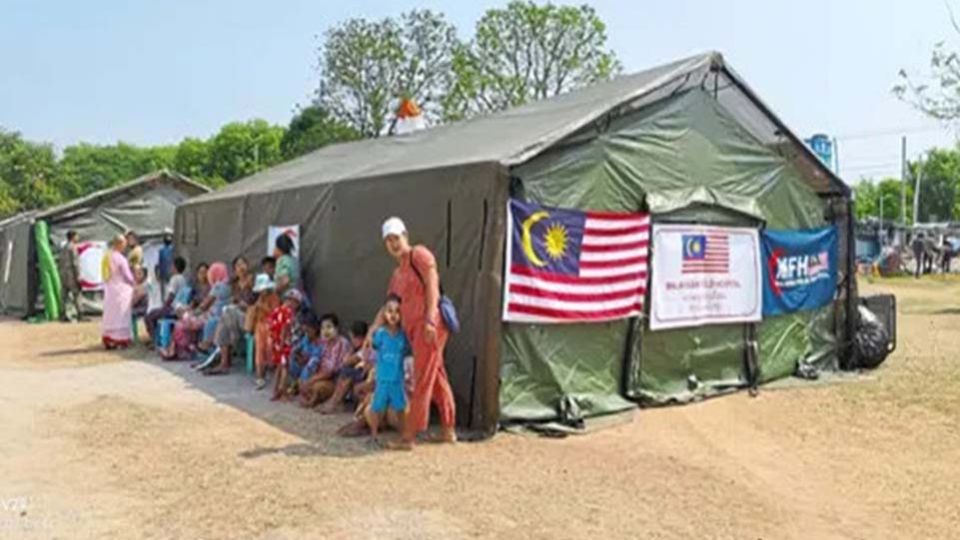August 28, 2025
KUALA LUMPUR – WHEN a powerful earthquake struck Myanmar on March 28, 2025, Malaysia was among the first to respond. Within days, the Malaysian Armed Forces established a 20-bed level-two field hospital in Sagaing Region under Operation Starlight III.
Over 38 days, 69 Malaysian Armed Forces personnel treated patients daily, performing surgeries, delivering babies and providing trauma care. A total of 3,032 earthquake survivors received much needed treatment.
This mission was more than humanitarian relief. It reflected the compassion, professionalism and credibility of our armed forces. It showed that defence is not only about protecting borders, but also about extending a hand of friendship when neighbours are in need.
This is the essence of defence diplomacy, where military strength is measured not only by deterrence, but also by the capacity to build trust and peace.
Defence diplomacy and Malaysia’s Asean chairmanship
Malaysia’s chairmanship of Asean comes at a critical moment. Early achievements already highlight how defence diplomacy strengthens Asean centrality.
By hosting the upcoming Asean Defence Ministers’ Meeting (ADMM) and the ADMM Plus in October, Malaysia provides an inclusive platform where regional and global powers can engage constructively.
In a region where tensions can easily escalate, the ability to keep dialogue open is itself an act of leadership.
As Chair, Malaysia has placed emphasis on practical cooperation. Joint training in maritime security, cyber defence, artificial intelligence (AI) and humanitarian assistance translates directly into outcomes people can feel: safer sea lanes, stronger protection against digital threats and faster disaster response.
In an interconnected world, no nation can manage these challenges alone.
Why defence diplomacy matters
There are four pillars that make defence diplomacy central to Malaysia’s security and foreign policy agenda.
First, dialogue preserves peace. In contested areas such as the South China Sea, regular engagement reduces the risk of miscalculation. Dialogue does not replace deterrence, but it prevents crises before they ignite.
Malaysia’s credibility was proven when the Prime Minister successfully mediated between Thailand and Cambodia earlier this month. What could have escalated into a prolonged standoff was contained through patient negotiation and Asean principles.
Second, partnerships strengthen security. Malaysia participates in more than 30 joint exercises each year covering counter-terrorism, humanitarian operations and maritime patrols.
The Five Power Defence Arrangements with Australia, New Zealand, Singapore and the United Kingdom remain one of the oldest security frameworks in the world and continues to play a stabilising role.
Every container ship that passes safely through the Straits of Melaka, which carries nearly 30% of world seaborne trade, is proof that maritime cooperation sustains both our economy and national survival.
Third, resilience is built through shared action. Malaysia has contributed more than 40,000 personnel to 38 United Nations peacekeeping operations since 1960, earning respect as a consistent contributor to global stability.
In the region, we have worked with neighbours in humanitarian assistance and disaster relief. From earthquakes to pandemics, these missions prove that resilience is never built in isolation.
Fourth, technology must be guided responsibly. AI is reshaping defence planning, intelligence and operations. It holds promise, but also risk. Without cooperation, AI could widen mistrust and fuel instability.
By working with Asean partners to shape responsible use of emerging technologies, Malaysia positions itself not only as a beneficiary of innovation, but as a leader in setting standards for security in the digital age.
A shield of prevention, backed by strength
Some may ask why resources should be invested in defence diplomacy when traditional defence already requires significant attention. The answer is clear – prevention is always more effective and far less costly than conflict.
Defence diplomacy builds trust, creates channels of communication and reduces the likelihood of confrontation.
Yet diplomacy alone is not enough. Malaysia will continue to invest in modernising the armed forces with high technology assets. This includes the introduction of new combat and mission ships, the procurement of maritime patrol aircraft, the expansion of unmanned aerial systems and the integration of advanced radar and cyber capabilities.
These assets are essential to defend our sovereignty and protect national interests.
Defence diplomacy complements these capabilities. Modern assets give credibility to dialogue, while diplomacy ensures they are used wisely and only when necessary. Together, they provide a shield of prevention backed by real strength.
Malaysia’s tradition of peace and leadership
Defence diplomacy reflects Malaysia’s identity as a nation of moderation, neutrality and respect for international law. Our foreign policy has always emphasised peaceful settlement of disputes and mutual respect. Extending these principles into defence amplifies our credibility and influence across the region.
It also embodies the values of Malaysia Madani. The same spirit that guided our soldiers in Myanmar is evident in counter-piracy patrols in the Gulf of Aden, in regional maritime cooperation, in the responsible integration of AI into defence planning and in our continuous peacekeeping deployments in Lebanon.
These actions remind the world that Malaysia’s strength lies not only in defending its territory, but in promoting peace and humanity wherever they are most needed.
Looking forward
As Malaysia leads Asean through a challenging year, defence diplomacy will remain our compass. Great power competition, cyber threats, maritime insecurity and the spread of AI demand steady leadership and the ability to bridge divides. Malaysia is well placed to play this role, guided by principle and strengthened by experience.
Defence diplomacy is not an option. It is a necessity. It ensures Malaysia remains secure, Asean remains central and peace remains possible.
The image of our armed forces treating earthquake survivors in Myanmar is a powerful reminder.
As we mark Merdeka, let us remember that a free Malaysia is secured not only by arms, but by trust and friendship.
Datuk Seri Mohamed Khaled Nordin is Defence Minister.
The views expressed here are his own.

